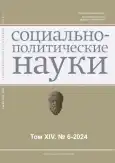Contradictions and challenges of national policy in the formation of social unity in Russia
- Authors: Pokhozhaev V.I.1
-
Affiliations:
- Military University named after Prince Aleksander Nevsky of the Ministry of Defense of the Russian Federation
- Issue: Vol 14, No 6 (2024)
- Pages: 247-251
- Section: Social and Political Philosophy
- URL: https://journals.eco-vector.com/2223-0092/article/view/654100
- ID: 654100
Cite item
Abstract
The relevance of addressing the problems of forming social unity is determined by the growing role of national identity and national cohesion at the present stage of Russia’s development. Despite the fact that both legal and organizational foundations for forming national unity have been created in Russia, today there are a large number of challenges and contradictions that, one way or another, affect the level of national cohesion. The need for further improvement of state policy in forming social unity requires new approaches to counter existing threats.
The purpose of the study was to analyze the essence of social unity, contradictions and challenges of Russia’s national policy as a factor in the formation of its social unity in modern conditions using a socio-philosophical methodology. It has been established that national policy as a factor of social unity, when faced with various challenges, requires proper and competent implementation, awareness of its place and role in all spheres of society.
Full Text
About the authors
Valeriy I. Pokhozhaev
Military University named after Prince Aleksander Nevsky of the Ministry of Defense of the Russian Federation
Author for correspondence.
Email: 11300vch@mail.ru
SPIN-code: 5749-3604
applicant, senior assistant to the Head, Department of Organization of Scientific Work and Training of Scientific and Pedagogical Personnel
Russian Federation, MoscowReferences
- Asimova M.M. Nation: philosophical, linguistic and sociological analysis. Bulletin of Science. 2021. Vol. 2. No. 3 (36). Pp. 5–17. (In Rus.)
- Aristotle. Works. Vol. 4. A.I. Dovatur (ed.). Moscow: Mysl, 1983. 830 p.
- Guazaa L., Schmidt V. On the concept of “national unity”. Bulletin of the Russian Nation. 2020. No. 4 (74). Pp. 66–82. (In Rus.)
- Katov V.V. Social harmony as an indicator of the progressive development of society and the . In: Regional economy: experience and problems. Materials of the XIV International Scientific and Practical Conference. Vladimir: VFFGBOU VO, 2021. Pp. 186–192.
- Krzhev V.S. Ethnic dimensions of history. In: Social philosophy and philosophy of history. Textbook. Moscow, 2019. Pp. 333–351.
- Malinovsky A.A. Social harmony and national unity – the basis of identity formation. Legal Bulletin of Dagestan State University. 2018. Vol. 26. No. 2. Pp. 56–60. (In Rus.)
- Plato, Aristotle. Politics. The Science of Governance. Moscow: Eksmo, 2003. 864 p. (Series: Anthology of Thought)
- Plato. State. In: Works. Vol. 3, 4. Moscow: Mysl, 1971. 654 p.
- Tishkov V.A. Forget about the nation (post-nationalist understanding of nationalism). Questions of Philosophy. 1998. No. 9. Pp. 3–26. (In Rus.)
- Toffler E. The third wave. Moscow: ACT LLC, 1999.
Supplementary files











